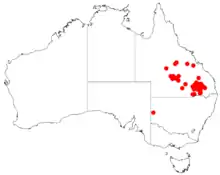Acacia aprepta
Acacia aprepta is a species of Acacia native to eastern Australia.[1]
| Acacia aprepta | |
|---|---|
| Scientific classification | |
| Kingdom: | Plantae |
| Clade: | Tracheophytes |
| Clade: | Angiosperms |
| Clade: | Eudicots |
| Clade: | Rosids |
| Order: | Fabales |
| Family: | Fabaceae |
| Clade: | Mimosoideae |
| Genus: | Acacia |
| Species: | A. aprepta |
| Binomial name | |
| Acacia aprepta | |
 | |
| Occurrence data from AVH | |
The tree can grow to a height of 10 m (33 ft) and has a spreading habit. It dark grey or black coloured bark that is longitudinally furrowed. The light brown to greyish, glabrous and resinous branchlets are angular to terete. Like most species of Acacia it has phyllodes rather than true leaves. The linear or very narrowly oblanceolate and flat phyylodes can be straight or slightly subfalcate. The scurfy olive-green phyllodes are 3.5 to 8.5 cm (1.4 to 3.3 in) in length and 3 to 8 mm (0.12 to 0.31 in) and have one to three prominent longitudinal veins. It blooms between October and January producing flower-spikes that occur in groups of one to three in the axils and are 0.6 to 3.5 cm (0.24 to 1.38 in) in length. After flowering light brown chartaceous seed pods form that have a linear or very narrowly oblong shape and are raised over the seeds. The pods are 2.5 to 6 cm (0.98 to 2.36 in) in length and 5 to 9 mm (0.20 to 0.35 in) wide. The dark brown seeds within have a broadly oblong shape and are 2.3 to 3.5 mm (0.091 to 0.138 in) long.[1]
It has a limited distribution in an area of south-eastern Queensland in the western parts of the Darling Downs and around Maranoa where it grows in shallow gravelly or loamy sandy soils often over sandstone as a part of scrubland communities where it can form dense thickets.[1]
See also
References
- "Acacia aprepta Pedley". World Wide Wattle. Western Australian Herbarium. 11 September 2018. Retrieved 24 August 2019.